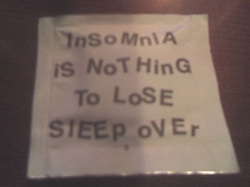Sleep
We all do it - a lot. It's an important part of our life, obviously. So it deserves a bit of attention and I'll be covering a few major concepts here: insomnia, the optimal amount of sleep, the purpose of dreams, and what makes you tired, or alternately energetic.
Insomnia

I have found falling to sleep easy most of my life, but have been fortunate enough to experience insomnia on several occasions. It was fortunate because it gave me the opportunity to explore and solve what is a particularly interesting problem. When I say that I have solved it, I am not saying that I can get every person with insomnia to never have difficulties sleeping, such as those with particular forms of brain damage, as brain damage is another problem entirely. I am saying that I have solved insomnia itself given that all other factors necessary for a normal sleep are present, and where certain self-control skills have been developed.
Insomnia consists of a few potential causes. The first cause is so simple, it would almost be funny if it wasn't negatively affecting people, it is simply a desire to remain awake that is stronger than the desire to fall asleep. The complication is that both these desires can be either conscious or unconscious in origin. The conscious one is easy to change, you just have to raise your self-awareness to the point that you realize that's what you are doing, at which point you will normally laugh about it and then simply decide to do something else. An unconscious desire to stay awake or fall asleep is a different matter. In particular, if you have depended upon an unconscious mechanism to fall asleep most of your life, and somehow in your mental development, you shut that off, falling asleep would become a skill you would either need to learn again how to do consciously or you would need to turn on that unconscious desire to fall asleep again. The same would apply if you had turned on a subconscious desire to stay awake. I will cover specifics on how to do this later.
The second cause of insomnia is having too much come to your attention when you are falling asleep. If, for example, you don't have a clear conscience about something, or something is seriously bothering you, this sometimes needs to be handled before you can succeed at falling asleep, unless you get completely exhausted. Some of the exercises in my book are particularly well suited to resolving this. Humourously, having things come to your attention can also include putting too much attention on the process of falling asleep itself. The way attention works is that if there is a change, the attention makes something pop up in your mind to get you to look at that change. If you are trying to fall asleep, but putting your attention on falling asleep at the same time, the second that some changes occur towards falling asleep, your attention will trigger and it will wake you up. To fall asleep you must intend and commit to falling asleep, and also commit to not consciously monitor yourself doing it, and just trust that those unconscious processes that are there will take over and do their job, following your intention. This is not necessarily an easy thing to do, and I have the benefit of having done extensive amounts of meditation in order to learn to control my intention and to simply acknowledge and let go of distractions, but the point is that it is possible.
Insomnia consists of a few potential causes. The first cause is so simple, it would almost be funny if it wasn't negatively affecting people, it is simply a desire to remain awake that is stronger than the desire to fall asleep. The complication is that both these desires can be either conscious or unconscious in origin. The conscious one is easy to change, you just have to raise your self-awareness to the point that you realize that's what you are doing, at which point you will normally laugh about it and then simply decide to do something else. An unconscious desire to stay awake or fall asleep is a different matter. In particular, if you have depended upon an unconscious mechanism to fall asleep most of your life, and somehow in your mental development, you shut that off, falling asleep would become a skill you would either need to learn again how to do consciously or you would need to turn on that unconscious desire to fall asleep again. The same would apply if you had turned on a subconscious desire to stay awake. I will cover specifics on how to do this later.
The second cause of insomnia is having too much come to your attention when you are falling asleep. If, for example, you don't have a clear conscience about something, or something is seriously bothering you, this sometimes needs to be handled before you can succeed at falling asleep, unless you get completely exhausted. Some of the exercises in my book are particularly well suited to resolving this. Humourously, having things come to your attention can also include putting too much attention on the process of falling asleep itself. The way attention works is that if there is a change, the attention makes something pop up in your mind to get you to look at that change. If you are trying to fall asleep, but putting your attention on falling asleep at the same time, the second that some changes occur towards falling asleep, your attention will trigger and it will wake you up. To fall asleep you must intend and commit to falling asleep, and also commit to not consciously monitor yourself doing it, and just trust that those unconscious processes that are there will take over and do their job, following your intention. This is not necessarily an easy thing to do, and I have the benefit of having done extensive amounts of meditation in order to learn to control my intention and to simply acknowledge and let go of distractions, but the point is that it is possible.
Dreams...

What are dreams? Have you ever wondered? Sometimes they can lead to profound insights, be incredibly scary or pleasant, or just be plain out totally wierd.
Well, it's simple. During the day you get a whole bunch of information, some of which makes sense consciously and gets filed away for later use, and some of which 'sticks' as it doesn't make sense. As you go through the day, you pick up more and more of these things you don't understand and your mental workspace fills up and becomes hard to navigate... it starts to require more effort and you get tired.
So you fall asleep and your unconscious mental processes try to make sense of the information as well, and failing that they try to simply weave them together into stories which can be stored and later used for creative purposes when brainstorming... whatever it can do to 'clean up' your mental workspace for you where you failed to do so consciously.
As the space is cleaned up, often some learning is also achieved as perhaps two concepts were learned in the day that couldn't easily connect with each other due to having other stuff in the way, so you may wake up with that as the first thought on your conscious mind.
Where the unconscious mechanisms and conscious mechanisms both fail to clean up some part of the workspace, you will get recurring dreams, recurring attempts to weave stories in the same way that has succeeded for most other things, but which for some reason fails to work for this particular item. It could be due to an extremely intense emotion being present that is so strong it disrupts the dreaming cleanup process itself, as one example.
Well, it's simple. During the day you get a whole bunch of information, some of which makes sense consciously and gets filed away for later use, and some of which 'sticks' as it doesn't make sense. As you go through the day, you pick up more and more of these things you don't understand and your mental workspace fills up and becomes hard to navigate... it starts to require more effort and you get tired.
So you fall asleep and your unconscious mental processes try to make sense of the information as well, and failing that they try to simply weave them together into stories which can be stored and later used for creative purposes when brainstorming... whatever it can do to 'clean up' your mental workspace for you where you failed to do so consciously.
As the space is cleaned up, often some learning is also achieved as perhaps two concepts were learned in the day that couldn't easily connect with each other due to having other stuff in the way, so you may wake up with that as the first thought on your conscious mind.
Where the unconscious mechanisms and conscious mechanisms both fail to clean up some part of the workspace, you will get recurring dreams, recurring attempts to weave stories in the same way that has succeeded for most other things, but which for some reason fails to work for this particular item. It could be due to an extremely intense emotion being present that is so strong it disrupts the dreaming cleanup process itself, as one example.
Optimal amount of sleep

There have been statistical studies on what constitutes the optimal amount of sleep for various age groups, based on associating sleep hours with the predisposition to accidents and longevity.
In general, the optimal amount of sleep has been measured to be between 7 and 8 hours a day. For some individuals it may be more or less, but these would be special cases.
As an individual sleeps less or more than the optimal amount, they are subjecting themselves to damage to some extent. However, the amount of damage is insignificant as you move slightly off of the optimal amount, so I believe the extra time in the day is worth it and that the optimal amount of sleep under normal circumstances is about 6 hours and 40 minutes.
Some activities are going to tire you out much more than others, however others will actually reduce your fatigue and need for dreaming. In particular, any activity which leaves you with unanswered questions or where you didn't really understand what happened will tire you out. On the other hand, any activity which resolves previously misunderstood information will increase your energy level and reduce the need for dreaming. If you have a lot of secrets and you expect that someone else may have found out about them, that leads to an incredible amount of unanswered questions about all the possible consequences of having those exposed which can be exhausting.
In general, the optimal amount of sleep has been measured to be between 7 and 8 hours a day. For some individuals it may be more or less, but these would be special cases.
As an individual sleeps less or more than the optimal amount, they are subjecting themselves to damage to some extent. However, the amount of damage is insignificant as you move slightly off of the optimal amount, so I believe the extra time in the day is worth it and that the optimal amount of sleep under normal circumstances is about 6 hours and 40 minutes.
Some activities are going to tire you out much more than others, however others will actually reduce your fatigue and need for dreaming. In particular, any activity which leaves you with unanswered questions or where you didn't really understand what happened will tire you out. On the other hand, any activity which resolves previously misunderstood information will increase your energy level and reduce the need for dreaming. If you have a lot of secrets and you expect that someone else may have found out about them, that leads to an incredible amount of unanswered questions about all the possible consequences of having those exposed which can be exhausting.
